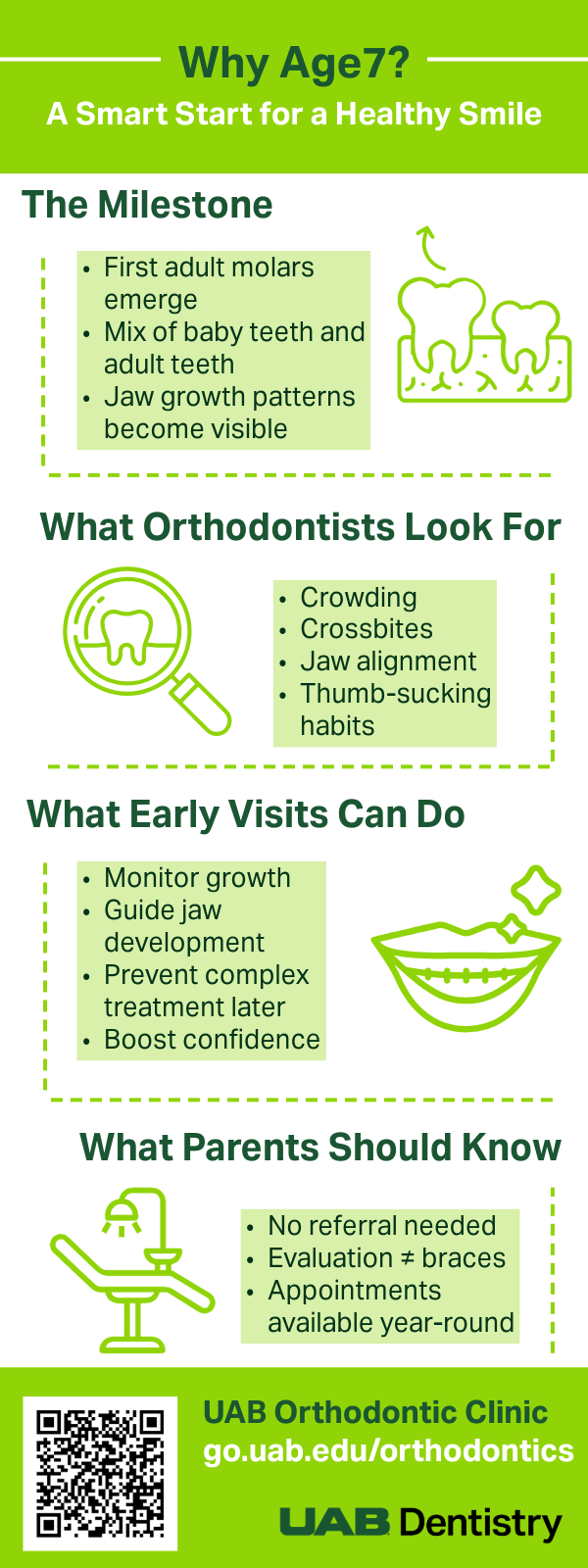By age 7, most children have a mix of baby and adult teeth – and, according to orthodontic specialists at the University of Alabama at Birmingham, that’s exactly when parents should schedule their child’s first orthodontic checkup.
 Early intervention can help correct issues like crowding, crossbites, irregularities in jaw development, and thumb-sucking habits before they become more severe.
Early intervention can help correct issues like crowding, crossbites, irregularities in jaw development, and thumb-sucking habits before they become more severe.
“Managing small discrepancies early would prevent larger problems in the future. Some of these could prevent the need for surgery or extractions,” said Dr. Chung Kau, chair of the UAB Department of Orthodontics.
While the American Association of Orthodontists has set aside a special day – July 7 – for an annual “Smiles at 7 Day,” UAB Orthodontics sees the milestone as more than a date on the calendar. It’s a window of opportunity.
Early orthodontic evaluation doesn’t always mean braces. It’s about identifying growth patterns and potential problems early, when they’re easier to manage.
“You can think of this check-up at age 7 like you would any other dental check-up,” says Dr. Heath Padgett, an orthodontics resident. “Hopefully, everything is normal and there is no need to start treatment right away, but if we are able to catch an issue early, we can really save the patient a lot of time and effort. It’s all about catching issues while they are small and having the ability to use the patient’s window of growth to our advantage.”
Take, for example, a child with a developing crossbite where the upper teeth fit inside the lower teeth when the mouth is closed. At age 7, an orthodontist can use simple appliances to guide jaw growth and prevent the issue from worsening. Left untreated, that same child might need surgery or more complex treatment as a teen.
For parents, the benefits of early evaluation go beyond aesthetics. Orthodontists can monitor how adult teeth are coming in, assess jaw alignment, and even help break habits like thumb-sucking that can affect oral development. In some cases, early treatment can reduce the need for more extensive procedures later – and it can also be the beginning of a lasting relationship between the child, their family, and their care team.
“Think of it like a well-child checkup, but for your child’s smile,” says Kau. “It promotes children’s dental health.”
What Parents Should Watch For
When to consider an early orthodontic checkup:
- Early or late loss of baby teeth
- Difficulty chewing or biting
- Mouth breathing
- Thumb-sucking past age 5
- Crowded, misplaced, or blocked-out teeth
- Jaws that shift or make sounds
- Teeth that don’t meet properly
Did you know?
Orthodontists can often spot issues that aren’t visible to parents or general dentists.
Kaci Jones, an orthodontic assistant builds on that. “Being able to start treatment at a young age allows us to grow a bond together throughout a child's orthodontic treatment. I love looking back and seeing how much patients change throughout their treatment and how confident they become with their smile. Smiles at 7 aren't just cute – they are full of courage, radiance, and they melt my heart. We don't teach them to smile, they teach us.”
The UAB team encourages families to take a proactive approach. The goal is to empower parents with the knowledge that age 7 is a key moment – not because treatment is always needed, but because it’s the best time to understand and plan for what’s ahead.
UAB’s orthodontic clinic, located on the third floor of the School of Dentistry, offers comprehensive orthodontic care using advanced imaging and digital diagnostics. The clinic’s mission is to make high-quality care accessible to families across Alabama
Appointments are available year-round, and referrals are not required. To learn more or schedule a consultation, visit the UAB Orthodontic Clinic